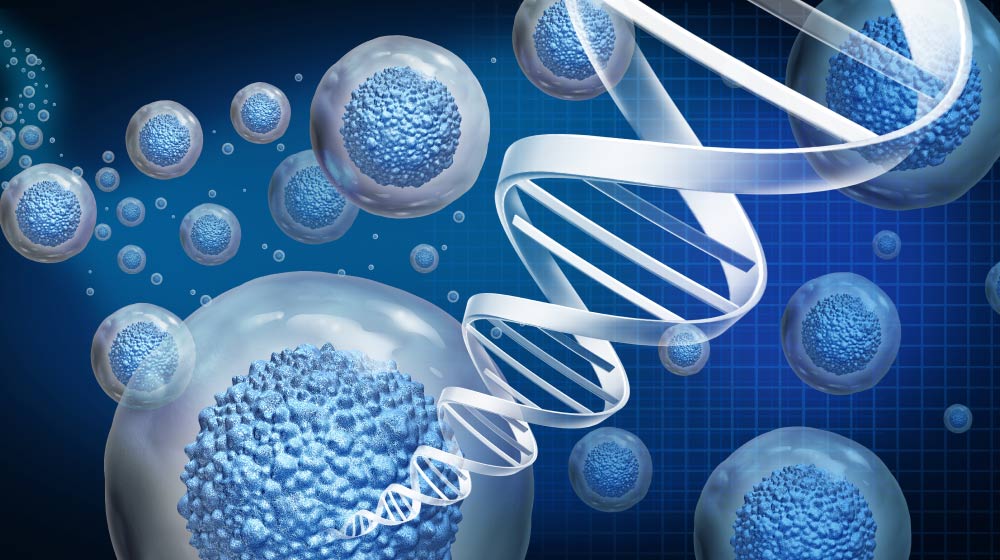Regenerative medicine and cell-based therapies have come a long way toward becoming a popular treatment for various health concerns. In today’s blog, we are going to introduce you to mesenchymal stem cells — multipotent stem cells that are expected to change the scene of orthopedics with the exceptional power to regenerate bones and worn-out cartilage.
How Mesenchymal Stem Cells Are Paving the Way for Regenerative Medicine
What Are Mesenchymal Stem Cells?
Mesenchymal stem cells are a multipotent subtype of stem cells that can only be found in mesodermal tissues, such as bone marrow, cartilage, muscles, dental pulp, adipose tissues, and umbilical cord tissue, to mention a few. The mesoderm germ layer forms during the early stages of embryonic development.
Some also call mesenchymal stem cells as mesenchymal stromal cells. The word “stromal” describes the cells’ ability to provide structural support to organs by transforming them into connective tissue. Herein, mesenchymal stem cells have been put into many debates due to their significant assistance in tissue engineering.
How Are Mesenchymal Stem Cells Harvested?
The harvesting of mesenchymal stem cells depends on the sources of cells. Here is the process of collecting MSCs:
- Bone Marrow Aspiration (BMA): Bone marrow aspiration is a procedure that collects a sample of bone marrow. In mesenchymal stem cell therapy, doctors insert a syringe into the bone marrow cavity to suck out the liquid part containing mesenchymal stem cells while the patient is under local or general anesthesia.
- Adipose Tissue Extraction: Doctors will harvest MSCs through a cosmetic procedure called liposuction. Anesthesia will be applied to the areas, and fat will be sucked out through a small incision. Then, they will isolate MSCs from the extracted fat.
- Umbilical Cord and Blood Tissue: The baby’s umbilical cord is another source of mesenchymal stem cells. After birth, the umbilical cord will be preserved in a bank for future use. However, these cells are for donation instead of being used to treat the host.
Once mesenchymal stem cells are collected, they will undergo a lab-controlled process where doctors will isolate the cells and grow them until they increase in number. Next, the cells will treat various conditions through regenerative medicine and cell-based therapies.
The Potential of Mesenchymal Stem Cell Therapy
As a smaller division of stem cells, mesenchymal stem cells can only differentiate into specific cells that rise from mesodermal germ layers (as discussed earlier). What can mesenchymal stem cells differentiate into? Here are the different types of mesenchymal stem cell differentiation:
- Chondrocytes (cartilage cells)
- Osteoblasts (bone cells)
- Neurocytes (nerve cells)
- Adipocytes (fat cells)
- Myocytes (muscle cells)
- Hepatocytes (liver cells)
- Cardiomyocytes (heart muscle cells)
- Pancreatic cells (pancreas cells)
- Endothelial cells (blood vessel cells)
- Epithelial cells (cells that line surfaces)
- Stromal cells
Mesenchymal stem cell therapy recruits the multipotency of MSCs to address and treat a wide range of medical conditions. Although research is still underway, the powerful stem cells are believed to be effective against the following health conditions:
Musculoskeletal and Orthopedic Conditions — By affecting joints, bones, and cartilage, these conditions may prevent affected individuals from navigating their lives at ease due to limited agility and mobility. In addition to medications, patients are required to undergo manual therapy to resume their flexibility.
- Bone Fractures: Mesenchymal stem cells help correct bone fractures and speed up healing due to bone-forming properties.
- Tendon and Ligament Injuries: Mesenchymal stem cells are ideal for repairing complicated injuries associated with tendons and ligaments.
- Osteoarthritis: Osteoarthritis is characterized by worn-out cartilage. Cartilage can’t regrow on its own, so patients with osteoarthritis have to undergo surgery to have lab-grown cartilage placed between the joints. As mesenchymal stem cells can differentiate into chondrocytes (cartilage tissues), it is an ideal candidate for the treatment of osteoarthritis.
Cardiovascular Diseases — Although advancements in medicine have alleviated the burden of heart diseases, issues related to the heart are somewhat challenging to control.

- Chronic Heart Failure: Mesenchymal stem cells are proven effective in regenerating heart muscle cells.
- Myocardial Infarction (Heart Attack): Regenerative properties of mesenchymal stem cells can help fix damaged heart tissues, further improving heart functions.
Autoimmune Diseases — In general, autoimmune diseases can’t be cured completely. It takes tremendous effort to manage conditions better.
- Multiple Sclerosis: In treating multiple sclerosis, mesenchymal stem cells can suppress autoimmunity.
- Rheumatoid Arthritis: The anti-inflammatory effects of mesenchymal stem cells can help fix the immune response in rheumatoid arthritis.
- Systemic Lupus Erythematosus (SLE): Mesenchymal stem cell therapy may effectively modulate immune response in SLE.
Neurological Disorders — Managing neurological disorders demands lots of attention and effort, not to mention specialized treatment and medications, to keep the condition under control. Research suggests that using mesenchymal stromal cells may help alleviate symptoms of complex disorders linked to the nervous system.
- Stroke: Stroke is a complicated health condition that doesn’t show any warning signs. Even if the stroke survivor receives in-time help, stroke can produce lasting, negative impacts on their speech and mobility because the oxygen supply to the brain is blocked. Mesenchymal stem cell therapy is demonstrated to assist in the recovery of brain function following a stroke.
- Amyotrophic Lateral Sclerosis (ALS): Mesenchymal stem cell therapy is protective of the neurons and can help reduce inflammation occurring in ALS.
- Parkinson’s Disease: Like Alzheimer’s disease, Parkinson’s disease is a degenerative condition with no cure. Using mesenchymal stem cells to treat Parkinson’s disease may provide healing effects in repairing brain damage and regenerating brain cells.
Respiratory Disorders — Available treatment forms only help heal the lungs and control symptoms for affected people.
- Idiopathic Pulmonary Fibrosis (IPF): Mesenchymal stem cells may reduce fibrosis and speed up the repair of damaged lung tissue.
- Chronic Obstructive Pulmonary Disease (COPD): Scientists have explored that mesenchymal stem cells’ anti-inflammatory and regenerative properties may help support lung tissue.
Inflammatory Bowel Diseases (IBD) — Severe digestive issues are difficult to treat and can interfere with the quality of life. Disease management requires several forms of treatment, from medications to surgery. However, patients may continue to experience persistent symptoms and decreased physical activity after treatment.
- Crohn’s Disease and Ulcerative Colitis: Mesenchymal stem cell therapy may help promote tissue repair and diminish inflammation in the gastrointestinal tract.
Other Conditions
- Diabetes Type 1 & 2: Mesenchymal stem cells may help regulate the immune response, improve insulin sensitivity, preserve insulin-producing cells, and reduce inflammation.
- Spinal Cord Injury: Mesenchymal stem cells have been investigated for their potential in promoting nerve cells.
How Much Does Mesenchymal Stem Cell Therapy Cost?
There is no fixed price for mesenchymal stem cell therapy because several factors contribute to the overall pricing structure. Some significant factors to consider include types of MSC therapy for different conditions, source of MSCs, location of treatment, number of treatments, regulatory environment, additional services, and post-treatment care. Moreover, health insurance doesn’t cover holistic medicine, so you should consider your budget and payment options before undertaking the cell-based therapy.
It is important to note that regenerative medicine in general and MSC therapy in specific are still not recognized as mainstream treatments in many countries. Some are still in clinical trials to confirm its efficacy and possible aftereffects. It is best to proceed with caution and connect with reputable clinics and professionals to assess your health status and goals and discuss the best treatment plan following the prior assessment.

